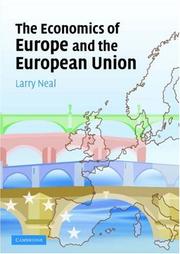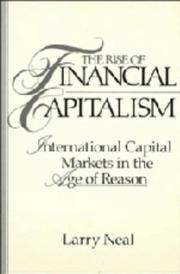| Listing 1 - 7 of 7 |
Sort by
|

ISBN: 9780521683012 9780521864510 0521683017 0521864518 9780511754142 9780511649073 051164907X 9780511273230 0511273231 9780511274022 0511274025 0511754140 9780511271618 0511271611 9780511573231 0511573235 1107713951 Year: 2007 Publisher: Cambridge New York Cambridge University Press
Abstract | Keywords | Export | Availability | Bookmark
 Loading...
Loading...Choose an application
- Reference Manager
- EndNote
- RefWorks (Direct export to RefWorks)
This distinctive textbook combines comprehensive coverage of the key policy areas of the European Union with analysis of individual countries, including the recent accession countries and Turkey. Part I analyzes the economic bases for the rise of the European Union from its origins in the post-World War II recovery to its historic enlargement in 2004. Part II takes up the different nation-state perspectives on the EU's economic policies by looking in turn at all European countries, whether members of the EU or not. The book is unique in providing both an EU perspective and European nation-state perspective on the major policy issues which have arisen since the end of World War II, as well as putting the economic analysis into an historical narrative which emphasizes the responses of policy-makers to external shocks such as the Cold War, the oil shocks, German reunification, and the collapse of the Soviet Union.
330.940559
---
BPB0801
---
339.92

ISBN: 052138205X 0521457386 0511665121 9780521382052 9780511665127 9780521457385 Year: 1990 Publisher: Cambridge: Cambridge university press,
Abstract | Keywords | Export | Availability | Bookmark
 Loading...
Loading...Choose an application
- Reference Manager
- EndNote
- RefWorks (Direct export to RefWorks)
This work establishes the existence of a sophisticated and smoothly functioning system of financial markets in the mercantile states of northwestern Europe throughout the 1700s. Based on computer analysis of thousands of price quotes from the financial press of the eighteenth century, the results should force both historians and economists to re-evaluate their understanding of the evolution of financial markets and their importance for the economic developments of that era.
World history --- anno 1700-1799 --- 331.161.1 --- Geschiedenis van het overheidskrediet en van de overheidsschuld. --- Capital market --- International finance --- History. --- History --- Marché financier --- Finances internationales --- Histoire --- Great Britain --- Netherlands --- Capital market - Great Britain - History. --- Capital market - Netherlands - History. --- International finance - History. --- 331.13 --- 331.162.1 --- AA / International- internationaal --- Capital markets --- Market, Capital --- Finance --- Financial institutions --- Loans --- Money market --- Securities --- Crowding out (Economics) --- Efficient market theory --- Geschiedenis van de handel --- Geschiedenis van het overheidskrediet en van de overheidsschuld --- Geschiedenis van de financiële markten --- Arts and Humanities --- Capital market - Great Britain - History --- Capital market - Netherlands - History --- International finance - History --- marche international des capitaux --- internationale kapitaalmarkt
Book
ISBN: 9780521895170 9780511757419 9780521154765 9780511757341 0511757344 0521895170 0511756925 9780511756924 1107201446 0511847084 0521154766 1282630970 9786612630972 0511757271 0511757069 0511757204 0511757417 Year: 2009 Publisher: Cambridge, UK New York Cambridge University Press
Abstract | Keywords | Export | Availability | Bookmark
 Loading...
Loading...Choose an application
- Reference Manager
- EndNote
- RefWorks (Direct export to RefWorks)
Collectively, mankind has never had it so good despite periodic economic crises of which the current sub-prime crisis is merely the latest example. Much of this success is attributable to the increasing efficiency of the world's financial institutions as finance has proved to be one of the most important causal factors in economic performance. In a series of insightful essays, financial and economic historians examine how financial innovations from the seventeenth century to the present have continually challenged established institutional arrangements, forcing change and adaptation by governments, financial intermediaries, and financial markets. Where these have been successful, wealth creation and growth have followed. When they failed, growth slowed and sometimes economic decline has followed. These essays illustrate the difficulties of co-ordinating financial innovations in order to sustain their benefits for the wider economy, a theme that will be of interest to policy makers as well as economic historians.
International finance --- World history --- anno 1600-1699 --- anno 1700-1799 --- anno 1800-1999 --- Financial institutions --- Capital market --- Banks and banking --- AA / International- internationaal --- 331.160 --- 332.109 --- Agricultural banks --- Banking --- Banking industry --- Commercial banks --- Depository institutions --- Finance --- Money --- Capital markets --- Market, Capital --- Loans --- Money market --- Securities --- Crowding out (Economics) --- Efficient market theory --- Financial intermediaries --- Lending institutions --- Associations, institutions, etc. --- Financiële geschiedenis: algemeenheden. --- Financiële geschiedenis: algemeenheden --- Financial institutions. --- Capital market. --- Banks and banking. --- Arts and Humanities --- History

ISBN: 9780195127058 9780195127041 0195127056 0195127048 Year: 2003 Publisher: New York (N.Y.): Oxford university press,
Abstract | Keywords | Export | Availability | Bookmark
 Loading...
Loading...Choose an application
- Reference Manager
- EndNote
- RefWorks (Direct export to RefWorks)
This classic book offers a broad sweep of economic history from prehistoric times to the present and explores the disparity of wealth among nations. Now in its fourth edition, A Concise Economic History of the World has been updated to reflect the stunning changes in the world economy since 1989. Truly a definitive history of globalization, the new edition has been expanded to include coverage of the most recent developments in the European Union, East Asia, and also in transition economies. Comprehensive and global in scope, this concise text features ample illustrations and a fully updated annotated bibliography that guides readers to the relevant scholarly literature. Now available in eleven languages, including Spanish (second edition), French, German (two volumes), Polish, and Chinese, this unique work remains an invaluable, lively, and accessible text for both undergraduate and graduate students of European economic history, the history of globalization, and world development.
World history --- Economic history. --- Histoire économique --- Economic History --- 338 <09> --- AA / International- internationaal --- 331.100 --- Economische geschiedenis --- Economische geschiedenis: algemeenheden. --- 338 <09> Economische geschiedenis --- Histoire économique --- Economic history --- Economic conditions --- History, Economic --- Economics --- Economische geschiedenis: algemeenheden
Book
ISBN: 9783319902470 Year: 2018 Publisher: Cham Palgrave Macmillan
Abstract | Keywords | Export | Availability | Bookmark
 Loading...
Loading...Choose an application
- Reference Manager
- EndNote
- RefWorks (Direct export to RefWorks)
Book
ISBN: 9781107019638 9781107019645 9781107036949 1107036941 1107019648 110701963X 9781139095105 9781107583351 9781139095099 9781107583283 9781107584594 Year: 2014 Publisher: Cambridge: Cambridge university press,
Abstract | Keywords | Export | Availability | Bookmark
 Loading...
Loading...Choose an application
- Reference Manager
- EndNote
- RefWorks (Direct export to RefWorks)
"Modern economic growth, defined as a sustained rise in per capita income (Kuznets 1966C001-025), has created higher levels of prosperity for many more people on earth than was ever thought possible before it began. Moreover, it began not so very long ago, perhaps as late as the middle of the nineteenth century and certainly not before the end of the seventeenth century"--
Ancient history --- World history --- Capitalism --- Economic History --- History --- Economic history. --- Capitalisme --- Histoire économique --- History. --- Histoire --- Economic history --- Histoire économique --- Histoire économique. --- Histoire. --- Business & economics --- 330.52 --- 338.313 --- AA / International- internationaal --- Liberaal systeem. Neo-liberalisme. Theorie van de onderhandeling. --- Kapitalisme. --- Economic conditions --- History, Economic --- Liberaal systeem. Neo-liberalisme. Theorie van de onderhandeling --- Kapitalisme --- Economics --- Capitalism - History --- Histoire économique.
Multi
ISBN: 1139892894 1107424836 1107422809 1107419654 1139856030 1107417090 1107420857 1107418348 1107039010 1299842178 9781107417090 9781139856034 9781107418349 9781107039018 9781107419650 9781107420854 9781139892896 9781107424838 9781107422803 Year: 2013 Publisher: Cambridge
Abstract | Keywords | Export | Availability | Bookmark
 Loading...
Loading...Choose an application
- Reference Manager
- EndNote
- RefWorks (Direct export to RefWorks)
Financial capitalism emerged in a recognisably modern form in late seventeenth- and eighteenth-century Great Britain. Following the seminal work of Douglass C. North and Barry R. Weingast (1989), many scholars have concluded that the 'credible commitment' that was provided by parliamentary backing of government as a result of the Glorious Revolution of 1688 provided the key institutional underpinning on which modern public finances depend. In this book, a specially commissioned group of historians and economists examine and challenge the North and Weingast thesis to show that multiple commitment mechanisms were necessary to convince public creditors that sovereign debt constituted a relatively accessible, safe and liquid investment vehicle. Questioning Credible Commitment provides academics and practitioners with a broader understanding of the origins of financial capitalism, and, with its focus on theoretical and policy frameworks, shows the significance of the debate to current macroeconomic policy making.
Finance, Public --- Capital --- Credit --- History. --- Europe --- Economic policy. --- Borrowing --- Finance --- Money --- Loans --- Capital assets --- Fixed assets --- Economics --- Capitalism --- Infrastructure (Economics) --- Wealth --- Cameralistics --- Public finance --- Currency question --- Business, Economy and Management --- Public finances --- History --- E-books --- World history --- anno 1500-1799 --- anno 1800-1899
| Listing 1 - 7 of 7 |
Sort by
|

 Search
Search Feedback
Feedback About UniCat
About UniCat  Help
Help News
News